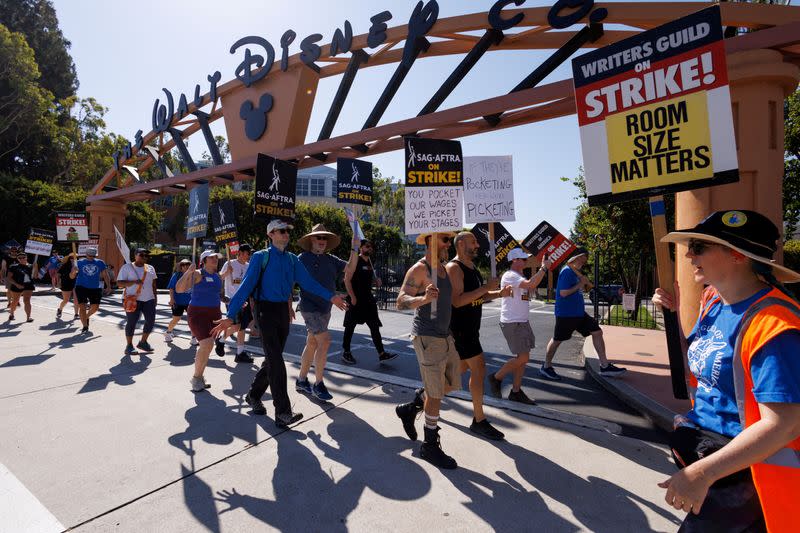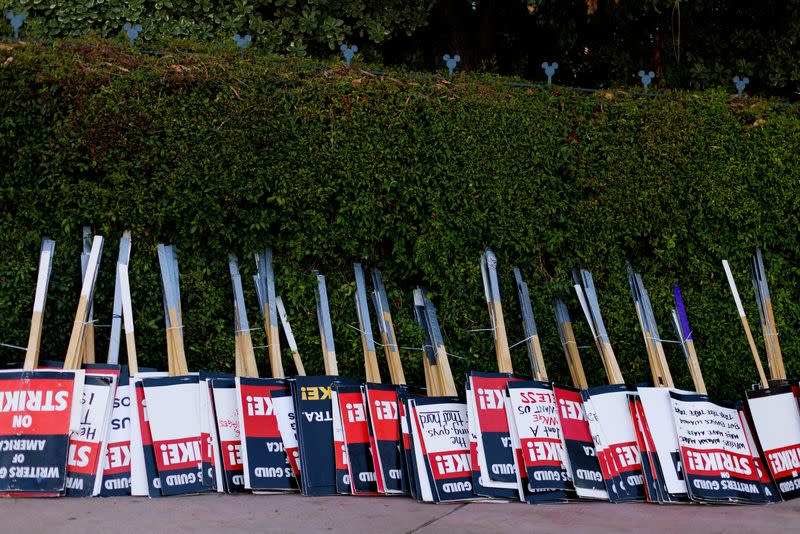Hollywood workers resort to flea markets, bake sales as strikes drag on
By Lisa Richwine
BURBANK, California (Reuters) - "Set decorator for 20 years. Single mom of 15-year-old twins," said the sign above a table of cupcakes, cookies and other baked goods for sale. "Struggling to pay bills, especially my mortgage."
A prop master nearby was selling handmade quilts, normally a side gig, to help make ends meet. "I now work two part-time jobs just to barely pay rent and utilities," her sign read.
The signs dotting a parking lot flea market described the hardships of crew members who have been out of work for months, collateral damage from twin strikes that shut down most scripted production across Los Angeles. Hollywood writers walked off the job in May, followed by actors in July.
IATSE, the union that represents lighting technicians, costume designers and others who work on film and TV crews, estimates that even though its members are not on strike, they have lost close to $2 billion in wages after productions shut down. Members have pulled $44 million from their retirement plans to cover current expenses, the union says.
"Members are really starting to feel the pressure," said Dejon Ellis, business manager with IATSE Local 80.
The motion picture and sound recording industries shed 17,000 jobs in August because of the strikes, according to U.S. government statistics.
Through mid-September, lost output from the strikes was estimated at around $5 billion across California and other production-heavy states such as Georgia and New Mexico, said Kevin Klowden chief global strategist at the Milken Institute, a think tank that studies the economy.
Writers and actors can apply for assistance from their unions, and some crew members are eligible for state unemployment benefits.
But that is not enough to cover basic costs of living, many entertainment industry workers said.
Daniel Fox, owner of North Pole Props, was liquidating his entire inventory at the crew-member flea market. His business had barely survived COVID, he said, and it was costing too much to store items that were no longer in demand.
"We definitely waited as long as we could," Fox said as shoppers browsed his collection of furniture, glassware and other props. "We just can't hold on any longer."
DEEPENING DEBT, FEW JOBS
Laura Seaman, the quilt maker, said she took a part-time job at the fabric store where she buys supplies. She also landed a role playing a monster at the Knott's Berry Farm theme park during Halloween festivities.
"I make enough pretty much for rent, and that's it," she said.
Around 65 people impacted by the strikes were selling memorabilia, baked goods, props or household items pulled from their own closets, according to flea market organizer Greg S. Gilday.
Gilday, a prop maker, said he had about $2,000 in debt when writers walked off the job in May. By late August, that had jumped to more than $25,000. He sold a motorcycle and was trying to earn more cash from his collection of Star Wars toys, vintage magazines and other items.
Film and television workers also have been competing for jobs as cashiers, waiters or babysitters.
Tiffany Puterbaugh, a costume designer and stand-up comic, said the large number of people affected by the strikes left few opportunities.
"There's no bartending jobs because every single person that is affected is like 'oh, I'll take any job that's available,'" Puterbaugh said. "There's nothing."
Puterbaugh said she has been selling furniture and vintage clothing collected from her work.
"I've been a literally starving artist for many years, so I get what it's like to be like scrappy and do side hustles," she said. "But this is really something I've never really experienced."
California Governor Gavin Newsom is considering whether to allow striking workers to apply for unemployment benefits. If he does sign the bill approved by the state legislature, the measure will not kick in until January.
It is unclear when the work stoppages might be resolved. Hollywood studios resumed negotiations with the Writers Guild of America this week, but no talks were scheduled with the SAG-AFTRA actors union.
In the meantime, stars including George Clooney, Dwayne Johnson and Meryl Streep have donated millions to Hollywood charities that assist industry workers.
IATSE gave $4 million earmarked for its members to aid organizations, Ellis said. That is long gone. It now has a GoFundMe page and operates a food pantry.
"We're trying not to go into our strike fund because it's not our strike," Ellis said.
Top Hollywood names also put together an auction to help crew members who have lost health insurance. On offer was a watercolor of the winner's dog painted by actor John Lithgow and a Zoom session with Nicole Kidman.
Writer Andrea Tyler said she has benefited from generous friends who offer help. She keeps her car parked and walks as much as possible to avoid paying for gas, now near $6 a gallon.
She eats most of her meals during the day at picket lines, where donated food is available.
"The end of the month always brings this panic of how am I going to get this done?" Tyler said at a picket outside Netflix.
(Reporting by Lisa Richwine; Editing by Mary Milliken and Aurora Ellis)


